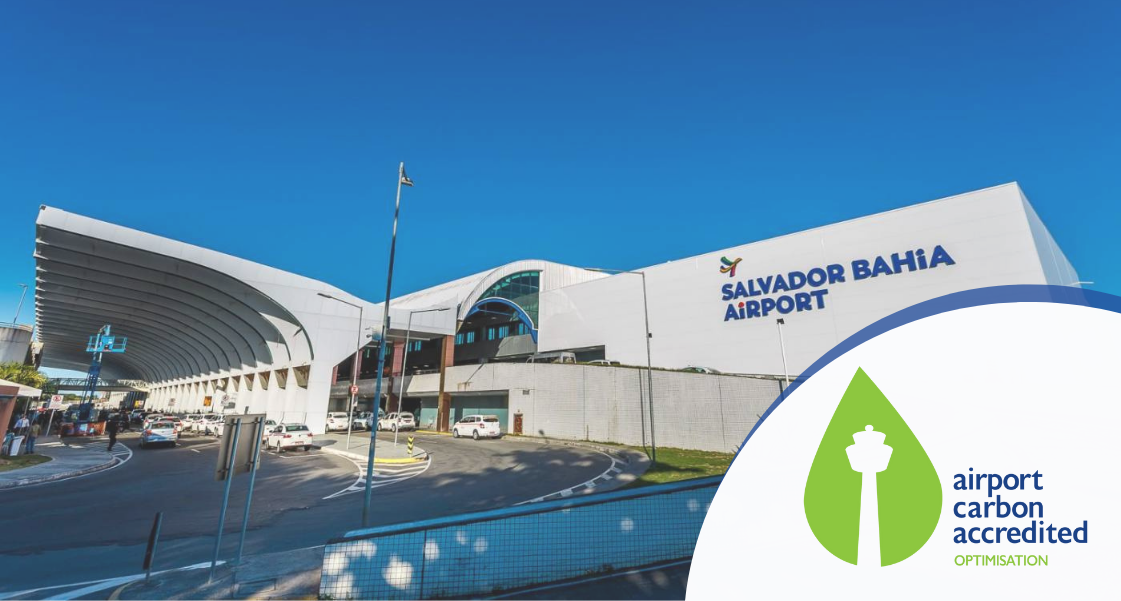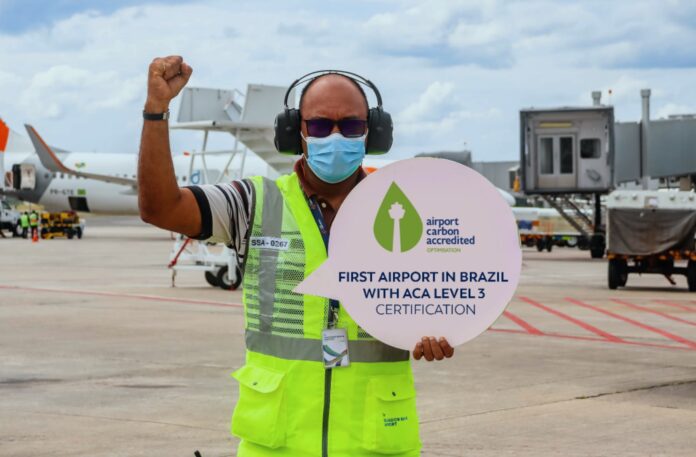Source: ACI-LAC
-
Salvador Bahia Airport is the first airport in the country to achieve Level 3 of Airport Carbon Accreditation, the only global certification program for carbon management approved for airports
The Airports Council International Latin America and the Caribbean (ACI-LAC) announces today, May 24, that Salvador Bahia Airport, operated by VINCI Airports, has just received Level 3 (Optimization) certification from the Airport Carbon Accreditation Program.
The airport in the capital of Bahia is the first in Brazil to achieve the third stage in a scale of 6 levels of certification for airports around the world that undertake efforts to reduce their carbon emissions.
Level 3 certification (Optimization) is granted to airports that, in addition to mapping their carbon footprint, achieve emission reductions based on pre-established criteria and involve third parties (from airlines to various service providers) in this process.
Salvador Bahia Airport stands out for several achievements in the field of sustainability, among them those related to waste and effluent management, increased energy efficiency and reduction of collisions between birds and aircraft.
The airport was the first in the North/Northeast regions and the second in Brazil to obtain Airport Carbon Accreditation level 1 certification in 2018, and level 2 in December 2019, when it recorded a 6.12% reduction in its carbon emissions.
The “Zero Landfill” program, which eliminated the disposal of solid waste produced inside the airport, also guaranteed Salvador Bahia Airport the Green Airport Recognition by ACI-LAC in 2021. In the previous year, the airport had already received the same recognition for its Wastewater Plant program, which allowed all effluent generated to go to an Effluent Treatment Plant, and 100% of the treated water to be reused for non-noble uses.
“We are very proud of this achievement. Reducing our carbon emissions is one of our missions as a company. Having the endorsement of the International Airport Council in this process reinforces our commitment and helps spread the culture of decarbonization,” said Julio Ribas, CEO of Salvador Bahia Airport.
“Salvador Bahia Airport has been proving over the last few years, with clear goals and assertive actions, how it is possible to make the transition of airports to the sustainability context that ACI seeks and encourages in its partners. It is with great pride that we register another achievement of Salvador Bahia Airport, certain that the airport moves towards the next stages of certification of the Airport Carbon Accreditation Program”, said Rafael Echevarne, director general of ACI-LAC.
ACI Airport Carbon Accreditation
Airport Carbon Accreditation (ACA) is the only global carbon management certification program approved for airports. It independently assesses and recognizes airports’ efforts to manage and reduce their carbon emissions through 6 levels of certification:
Level 1 ‘Level 1’: Airport identifies its carbon footprint, identifies sources and calculates annual emissions.
Level 2 ‘Reduction’: Airport proves emissions reduction with evidence of procedures and compliance with carbon management targets.
Level 3 ‘Optimization’: Airport expands scope of emission reductions and involves third parties in the process.
Level 4 ‘Neutrality’: Airport meets the requirements of the previous stages and offsets the remaining emissions with carbon credits.
Level 5 ‘Transformation’: Airport defines long-term carbon management strategy oriented towards absolute emissions reduction.
Level 6 ‘Transition’: In addition to meeting the previous steps, airport offsets remaining carbon emissions over which it has control.
Through these steps, Airport Carbon Accreditation recognizes that airports are at different stages in their journey toward comprehensive carbon management. It is a program for airports of all sizes and is based on internationally recognized methodologies, providing airport operators with a common framework for carbon management with measurable targets.
The program is site-specific, allowing flexibility to take into account national or local legal requirements.
Currently, nearly 400 airports worldwide are part of the Airport Carbon Accreditation program. In the Latin America and Caribbean region, there are 54 airports.
The 6 Brazilian airports certified are: Brasília International Airport, Natal International Airport, Rio de Janeiro Tom Jobim International Airport and Santos Dumont Airport (at level 1 – “Mapping”), Belo Horizonte International Airport (at level 2 – “Reduction”), and Salvador International Airport (at level 3 – “Optimization)


